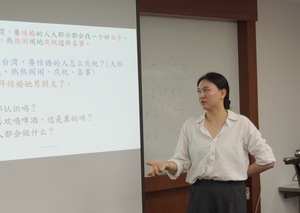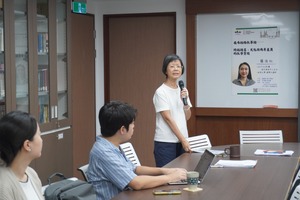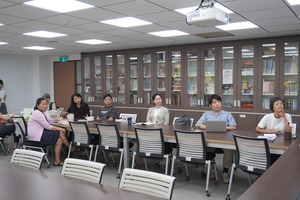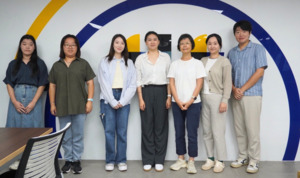Teaching Mandarin in Prague: Pedagogical Practices Across Language, Culture, and Cross-Strait Differences in Teaching




Date :
2025-08-22
Department :
Chinese Language Center
【Article by Chinese Learning Center】
As Mandarin becomes one of the world’s major options for foreign language learning, an increasing number of Taiwanese teachers are venturing abroad to teach. Yet, many remain concerned: “Can one truly teach Mandarin effectively without speaking the local language?”
On August 19, 2025, the Chinese Learning Center of National Chengchi University (NCCUCLC) invited Director Jia-hong Jian, lecturer in the Department of Sinology at Charles University (Czech Republic) and Director of the UAAT-ICU Mandarin Learning Center, to deliver a sharing session titled “Teaching Mandarin in Prague: Navigating Language, Culture, and Cross-Strait Differences”. The event was held in a hybrid format and drew over 50 participants from diverse fields. Attendees posed numerous questions, and Director Jian responded with detailed insights into the challenges which Mandarin teachers often encounter abroad.
With many years of teaching experience in China, Korea, Poland, and the Czech Republic, Director Jian possesses extensive cross-cultural expertise. Using her teaching practice at Charles University as an example, she shared how students can grasp new vocabulary, grammar, and near-synonyms without relying on Czech or English; how to integrate cross-strait teaching traditions in a culturally diverse environment; and what pronunciation, lexical, and grammatical challenges Taiwanese teachers typically face.
She emphasized that in a “non-target language environment”— where students have limited opportunities to use Mandarin in daily life—teachers must design lessons with greater precision. Tools such as visuals, gestures, and contextualized activities help learners overcome barriers and gradually develop a sense of the language. Jian highlighted the importance of understanding students’ proficiency and cultural background in order to create tailored lessons within the bounds of comprehensible input. For example, if students have already learned “colors”, “fruits” and “milk”, a lesson on “tea” can be extended to “black tea”, “fruit tea” and “milk tea”. In this way, instruction can remain entirely in Mandarin, without recourse to local or other intermediary languages.
Beyond language issues, differences in teaching style also present challenges. Since international Mandarin programs often use pinyin and simplified characters, Director Jian noted that Taiwanese teachers should acknowledge and respect the distinct teaching traditions across the Taiwan Strait, while maintaining Taiwan’s strengths in language, culture, and material design.
“Taiwanese teachers are known for their lively and engaging classes, but they must pay close attention to pronunciation and grammar errors,” Director Jian remarked. “For instance, the phrase ‘我等下要去用頭髮’ (‘I’m going to get my hair done’) is commonly used in Taiwan, but the verb ‘用’ literally means ‘to use,’ which does not conform to standard Mandarin usage. Similarly, the sentence ‘我要給別人按摩’ is ambiguous, as it could mean either that the speaker will receive a massage or that he/she will give a massage to someone. Such expressions can easily cause confusion,” she added.
Comparing teaching approaches in Taiwan and mainland China, Director Jian stressed: “Only by knowing both sides can Taiwanese teachers showcase their strengths on the international stage while effectively addressing student needs.”
For Taiwanese teachers aspiring to work abroad, Director Jian’s insights offered not only practical solutions but also new perspectives: How can Taiwan’s Mandarin teaching embrace global trends while preserving its uniqueness? This, she suggested, will be a key question moving forward.
Many participants expressed that the session gave them a clearer understanding of both the challenges and opportunities in international Mandarin teaching, which will greatly benefit their career planning. The NCCU Chinese Learning Center also announced that it will continue collaborating with the UAAT-ICU Mandarin Learning Center to organize more lectures and activities on teaching Chinese in the Czech Republic and beyond, with the goal of helping Taiwanese teachers step onto the global stage while enhancing the visibility and impact of Taiwan’s Mandarin education.
As Mandarin becomes one of the world’s major options for foreign language learning, an increasing number of Taiwanese teachers are venturing abroad to teach. Yet, many remain concerned: “Can one truly teach Mandarin effectively without speaking the local language?”
On August 19, 2025, the Chinese Learning Center of National Chengchi University (NCCUCLC) invited Director Jia-hong Jian, lecturer in the Department of Sinology at Charles University (Czech Republic) and Director of the UAAT-ICU Mandarin Learning Center, to deliver a sharing session titled “Teaching Mandarin in Prague: Navigating Language, Culture, and Cross-Strait Differences”. The event was held in a hybrid format and drew over 50 participants from diverse fields. Attendees posed numerous questions, and Director Jian responded with detailed insights into the challenges which Mandarin teachers often encounter abroad.
With many years of teaching experience in China, Korea, Poland, and the Czech Republic, Director Jian possesses extensive cross-cultural expertise. Using her teaching practice at Charles University as an example, she shared how students can grasp new vocabulary, grammar, and near-synonyms without relying on Czech or English; how to integrate cross-strait teaching traditions in a culturally diverse environment; and what pronunciation, lexical, and grammatical challenges Taiwanese teachers typically face.
She emphasized that in a “non-target language environment”— where students have limited opportunities to use Mandarin in daily life—teachers must design lessons with greater precision. Tools such as visuals, gestures, and contextualized activities help learners overcome barriers and gradually develop a sense of the language. Jian highlighted the importance of understanding students’ proficiency and cultural background in order to create tailored lessons within the bounds of comprehensible input. For example, if students have already learned “colors”, “fruits” and “milk”, a lesson on “tea” can be extended to “black tea”, “fruit tea” and “milk tea”. In this way, instruction can remain entirely in Mandarin, without recourse to local or other intermediary languages.
Beyond language issues, differences in teaching style also present challenges. Since international Mandarin programs often use pinyin and simplified characters, Director Jian noted that Taiwanese teachers should acknowledge and respect the distinct teaching traditions across the Taiwan Strait, while maintaining Taiwan’s strengths in language, culture, and material design.
“Taiwanese teachers are known for their lively and engaging classes, but they must pay close attention to pronunciation and grammar errors,” Director Jian remarked. “For instance, the phrase ‘我等下要去用頭髮’ (‘I’m going to get my hair done’) is commonly used in Taiwan, but the verb ‘用’ literally means ‘to use,’ which does not conform to standard Mandarin usage. Similarly, the sentence ‘我要給別人按摩’ is ambiguous, as it could mean either that the speaker will receive a massage or that he/she will give a massage to someone. Such expressions can easily cause confusion,” she added.
Comparing teaching approaches in Taiwan and mainland China, Director Jian stressed: “Only by knowing both sides can Taiwanese teachers showcase their strengths on the international stage while effectively addressing student needs.”
For Taiwanese teachers aspiring to work abroad, Director Jian’s insights offered not only practical solutions but also new perspectives: How can Taiwan’s Mandarin teaching embrace global trends while preserving its uniqueness? This, she suggested, will be a key question moving forward.
Many participants expressed that the session gave them a clearer understanding of both the challenges and opportunities in international Mandarin teaching, which will greatly benefit their career planning. The NCCU Chinese Learning Center also announced that it will continue collaborating with the UAAT-ICU Mandarin Learning Center to organize more lectures and activities on teaching Chinese in the Czech Republic and beyond, with the goal of helping Taiwanese teachers step onto the global stage while enhancing the visibility and impact of Taiwan’s Mandarin education.
